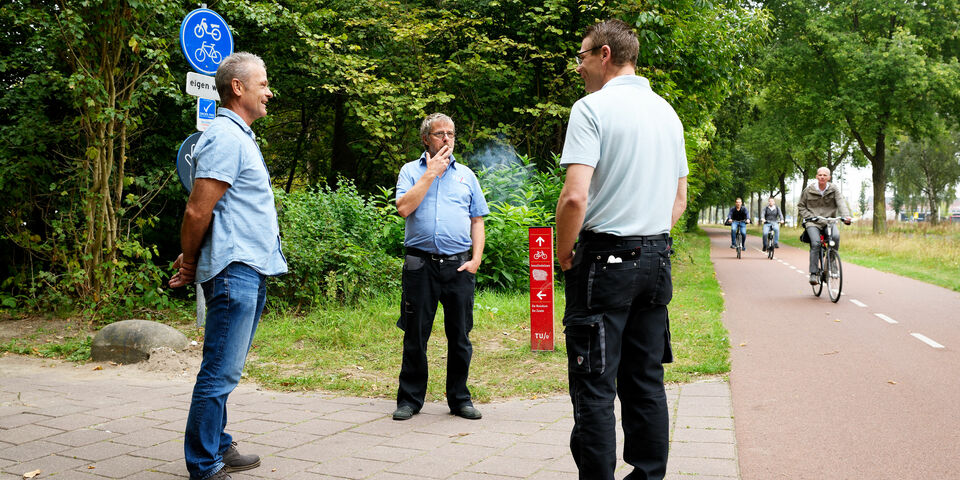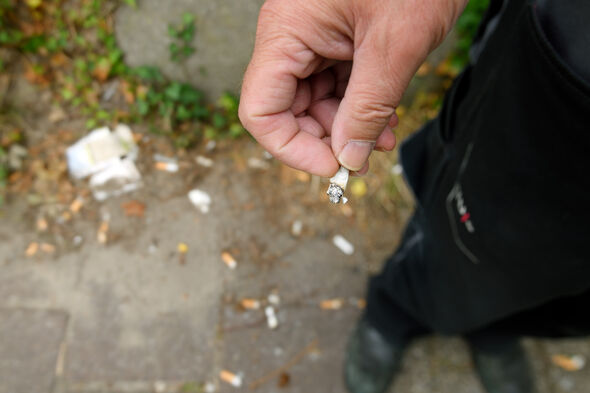"There's me smoking on the edge of the street, wearing my TU/e shirt"
Between them, they puff their way through tens of cigarettes every day. Partly during work time, even though it means accepting their banishment to the edge of the campus, where a smoking ban has been in place since August 1st. A ban that colleagues Peter van Rooij, Harold Ronde and Jori van Deursen fully understand, it must be said - although they do think TU/e could have spent a little longer pondering the unintentional new face of the university created by its smoking employees.
They are only too keen to stop, explains this threesome in the BBC building on the east side of the campus. For once and for all, seriously this time. In fact, they had agreed among themselves, in view of the campus smoking ban as of August 1st, to give it a go right after the summer vacation. Van Deursen, logistics staff member hazardous materials, “I had left my pouch of rolling tobacco at home, but then I saw them here smoking as per usual and I drove right over to the gas station.”
It is not a pretty sight, the three men agree, people “sometimes dozens” standing strung out along the bike path on the Dorgelolaan, fuelling their addiction. Van Deursen points to the logo on his chest, “There's me, smoking on the edge of the street, wearing my TU/e polo shirt. It's not the image you want to project, is it? No thought has been paid to that.” Better, he says, to have designated “invisible smoking zones” on the campus, out of sight of everyone.
More than twenty years now, Van Deursen has been smoking, having once started as a teenager in a social circle in which almost everyone smoked. “Later on I used to work in construction, everyone and everything there stank of smoke. You didn't know any different.”
Your turn
Like his colleague Harold Ronde, he recently signed up for the' stop' training for TU/e employees, due to start in October. But he is keeping his expectations low key, “I'll wait and see. But I am keen. Not that I really have a choice, you're giving yourself cancer if you don't. Sooner or later it'll be your turn.” In his circle, many smokers have now stopped, he tells us. Like his mother, twenty years ago in fact, followed last year by his father, “after a bad COPD attack”.
Read on below the photo.
Ronde, chemical substances (inc. waste) employee, is approaching the course with a little more confidence. Some thirty-five years' experience is noted on his smoker's résumé, starting with teenage antics, when he would snaffle the occasional smoke from the glasses of cigarettes that stood invitingly on tables at parties. Ten cigarettes he averages a day at the moment, as yet without any health problems, he himself says, knocking on wood.
He's already taken a 'stop' course, fifteen years ago, through a previous employer - and with (for a while) success. The number one trick: to break simple everyday routines so that you don't reach automatically for a cigarette - sitting in a different chair for once, for instance, farther away from the ash tray. Eighteen months he managed to last without cigarettes. “I felt much fitter. And your food instantly tastes a lot better.”
The end came with a week's vacation in Germany, with family. “My father-in-law smoked like a chimney. I didn't want to spend a week sitting in someone else's smoke. I thought, ‘Suppose I buy a pouch of rolling tobacco and smoke with him, just for a week’. Thanks to him, I picked it up again.” Van Deursen's response is strict: “But you were the one who lit it.”
All in the mind
In spite of this, Ronde is feeling confident about his second course. “They can use whatever method they like to help me. As long as I've kicked the habit at the end of it. My wife would like me to stop, too.” The talking and listening are having an effect on Van Deursen; his mood is suddenly more positive. “Anyone can do it. It's all in the mind, that's all, same as with alcohol and sugar.”
Peter van Rooij, team leader at Waste Management & Logistics, has no time for the upcoming TU/e course - however much Harold Ronde, motivated by collegial feeling and the notion of ‘together we stand strong’, would have liked it otherwise. “I have to do it myself, in my own way and at a time I choose,” says Van Rooij. “Other people saying this or that is the right way, that's more likely to be counterproductive for me.”
Like Ronde, he has also been smoking for some thirty-five years, having become hooked by his former colleagues at a removals company. “We once had to drive to Groningen and there were four of us in the truck, and three of us smoking. When I asked whether it would be possible to open a window, the reply was, ‘Just light one up yourself.’”
He continues, “I did stop once, for three months. But you can't help longing for it again. ‘Just one won't hurt.’” Now he's up to 25 to 35 a day. “It's dumb reasoning, I suppose, but as long as you don't have any health problems, you do think, 'It's still okay.’” And this whilst, he says, only three of those tens of daily cigarettes actually taste really good: the ones after meals. “The rest is all just habit.”
He would like to try and stop, one day. Maybe together with his wife, also a smoker? “Better not, then we'd both be irritable.”
'No negative experiences'
Peter van de Burgt, occupational health & safety and environmental coordinator at TU/e, and project leader of ‘smoke-free campus’, has picked up no negative reactions or experiences in relation to the campus smoking ban. Despite the added communication challenge in these times of corona and working from home, people appear to know about the smoking ban. And, according to the reception staff whose opinions Van de Burgt asked, they are respecting the rule. “Security staff making their rounds have spoken occasionally to a smoker who wasn't aware of the rule. These situations were resolved peacefully and without incident.”
For the stop smoking program run by SineFuma in the Student Sports Centre (offered free of charge and facilitated by TU/e) the project leader says five employees have signed up. “Of course, you may think ‘so few’ - but I see five employees who want to stop, and every employee counts. For me, each one is a triumph.”




Discussion